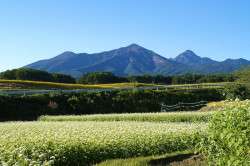
Originally published on metropolis.co.jp on June 2012

When I woke this morning, my bedroom was bathed in warm sunlight. It was not yet six in the morning and the sun was already peeking over the neighboring buildings and coming in through the windows.
“What a waste,” I thought as I crawled out of my futon.
Japan is not what I would call a morning country. Coffee shops and sports clubs don’t open until 7 or 8am at the earliest. Many of the better bakeries are still closed at 9:30am, and few restaurants bother to serve the most important meal of the day, breakfast. Contrast that with the US where you can work out at the gym from five in the morning and then promptly nullify the benefits of all that iron-pumping by gorging yourself on blueberry pancakes and bacon by six.
And yet, as the nation’s salarymen cover their heads with their pillows and try to sleep off their hangovers, the sun has been shining for two, three, and as many as four hours. This morning in Kyushu, for instance, the sun rose at 5:10am. In Tokyo, daybreak was at 4:27am. And, in Sapporo, dawn cracked at a remarkable 3:59am (around the summer solstice, sunrise comes as early as 3:30am): which begs the question: why doesn’t Japan have two time zones?
But let’s not get ahead of ourselves. First thing’s first: Japan needs to re-adopt daylight-saving time (DST).
Re-adopt, you ask?
During the American occupation, Japan did observe DST for a spell, but abandoned it in 1951 when MacArthur left. For the average Japanese in those post-war years the extra hour of daylight in the evening equated to little more than an extra hour of labor.
But that was then and this is now.
With all fifty-four of the nation’s nuclear power plants idled indefinitely, Japan faces the daunting task of not only producing enough electricity, but also bringing consumption down during the summer months—precisely at the time when energy demand usually peaks. Failure to do so may lead to a repeat of the disruptive blackouts that plagued Japan last summer when the nation still had eleven nuclear reactors online. Daylight-saving time, specifically “double summer time,” may provide the answer.
While the energy-saving benefits of DST remain a contentious issue in the West, an interesting study conducted at the Toyohashi University of Technology by Wee-Kean Fong (Energy Savings Potential of the Summer Time Concept in Different Regions of Japan From the Perspective of Household Lighting; 2007) has shown that the implementation of a “split summer time”—whereby the southwestern half of the country moves its clocks an hour forward in April and the northeastern half of Japan, two—that is, double summer time—could provide considerable savings in energy consumption.
Were double summertime adopted, the Sapparo sun would rise at 5:59am and set at 9:05pm, providing plenty of sunlight when it is most needed. The benefits of DST, however, wouldn’t end there. According to the October 28, 2010 issue of The Economist, “adopting DST would mean a new dawn for the Japanese economy . . . boost[ing] domestic consumption, as people leave work for bars, restaurants, shopping and golf. Summer time is credited with reducing traffic accidents and crime; boosting energy efficiency as people use less lighting and heating; and even improving health as people are radiated with vitamin D.” The economic benefit, the article continues, could add as much as ¥1.2 trillion (USD $15 billion) to Japan’s GDP and generate 100,000 jobs.
Coming from America’s northwest where the sun sets as late as nine in the evening during the summer, I don’t need to be sold on the benefits of daylight-saving time. Summers, thanks to a simple biannual adjustment of the clock, have always been a time for late evening barbecues with family, twilight concerts in the parks, and relaxed meals at outdoor cafes with friends. The challenge, however, lies in convincing the average Japanese that, in addition to the conservation benefits of extra sunlight in the evening, DST could mean a better quality of life, not just more work.
Until then, all that beautiful sunlight will continue to go to be squandered. Mottai nai!
Have something to say about this story? Share your comments below.







